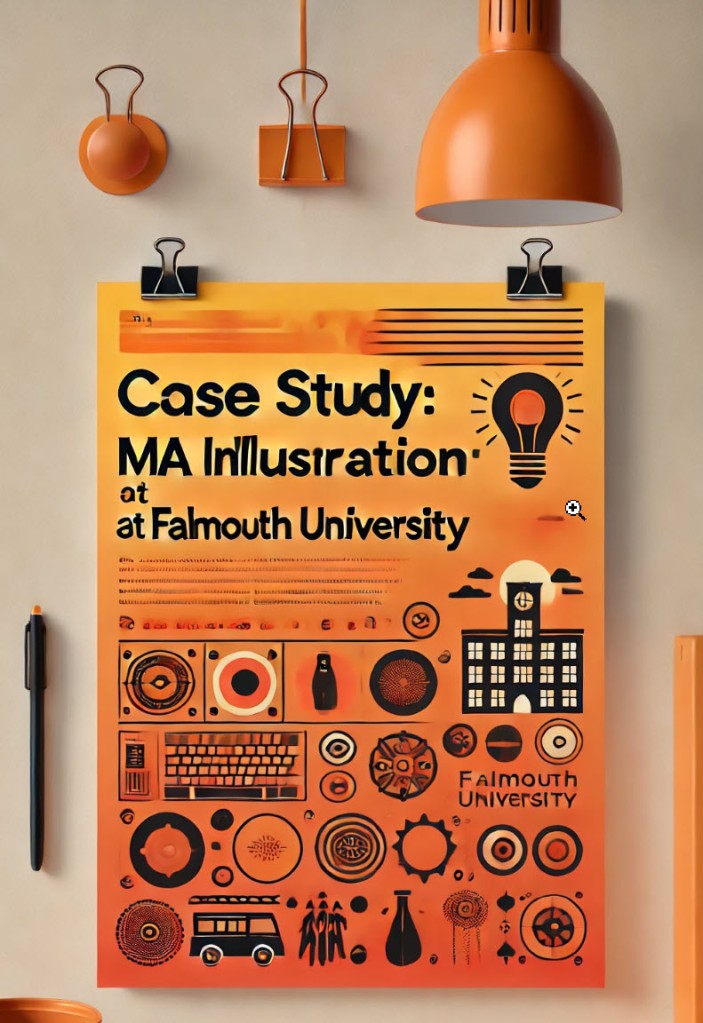Tags
Education, technology, teaching, CEO, learning, online-learning

The MA Illustration program at Falmouth University stands as a beacon of innovation in the realm of online creative education. With its inception seven years ago and its doors opened digitally six years back, this program has evolved into a model of how to effectively deliver a fully online course that maintains a strong sense of community and fosters individual creativity.
The Journey of Development
Initially, the course was content-heavy, designed to ensure every week was packed with lectures, quizzes, and assignments. However, this approach soon proved overwhelming. Over the years, the course underwent significant refinements, focusing on essential learning outcomes and reducing unnecessary complexity. This evolution allowed the course to adapt more naturally to the needs of its students, especially during the COVID-19 pandemic, which highlighted the importance of robust online learning systems.
Structure and Flexibility
A hallmark of the MA Illustration program is its flexible structure, accommodating the varied schedules of its global student body. The course operates on a weekly content delivery model, which includes recorded lectures, live discussions, and office hours. This consistent rhythm helps students manage their time effectively, irrespective of their geographical location.
Unlike undergraduate programs, this MA program expects students to have an established practice in illustration. The focus is on developing these skills through research and reflection rather than teaching new technical skills. This approach aligns well with the professional paths of many illustrators, who often work remotely and independently.
Fostering a Community
Community building is a core aspect of the MA Illustration program. Group tutorials and critique sessions are integral, encouraging peer interaction and collaborative learning. Students are urged to form study groups and engage with each other both formally during classes and informally through various communication platforms.
An innovative feature of the course is the student-led week in each module. During this week, students take control, presenting tutorials and leading discussions. This not only enhances their presentation skills but also fosters a sense of ownership and responsibility, crucial for their professional growth.
Assessment and Creative Expression
Assessments in the MA Illustration program have evolved to include live presentations. This method allows students to be creative in how they present their work, accommodating various forms of expression. The final major project, for instance, is assessed through a live presentation, offering students the opportunity to showcase their work in innovative ways.
Overcoming Challenges
Like any online program, the MA Illustration course at Falmouth University has faced its share of challenges. Managing time zone differences and ensuring effective communication were initial hurdles. However, maintaining a regular schedule for content delivery proved more effective than attempting to tailor timings for each time zone.
Addressing student anxieties, particularly around whether they are “doing the right thing,” has been another focus. The first module is designed to ease students into the online environment with unassessed initial projects. This approach helps them gain confidence without the pressure of grading.
Technological Integration
Students use various technologies for networking and collaboration. While the university provides access to platforms like Teams, students often create their own groups on Facebook, WhatsApp, or other social media platforms. This organic formation of study groups mirrors the informal interactions that occur in physical campuses, fostering a robust peer network.
Intellectual Property and Copyright
The program adheres to strict intellectual property guidelines, ensuring proper attribution of all work using the Harvard referencing system. Guest lecturers sometimes express concerns about recording their content due to ownership issues, but the course maintains a clear distinction between the recording time, which belongs to the university, and the intellectual content, which remains with the creator.
Induction and Onboarding
Setting the right expectations is crucial for any online course. The induction process at Falmouth University aims to help students understand the online learning environment and the course culture. This includes explaining the nature of online interactions, response times for queries, and the overall structure of the course.
Joys and Highlights
Barnaby Lickens-Richards, the course leader, finds immense joy in seeing students with special needs or significant challenges succeed in completing their MA. For Sara Cadima Feio, a unit leader and alumna, the most rewarding moments come from witnessing students engage in meaningful debates during group critiques, enriching the learning experience through diverse perspectives.
Conclusion
The MA Illustration program at Falmouth University exemplifies the potential of online creative education. By fostering a strong community, providing flexible learning opportunities, and continuously evolving to meet the needs of its students, the program not only equips illustrators with advanced skills but also prepares them for the dynamic professional world. This case study underscores the success of integrating traditional educational values with modern online methodologies, paving the way for future advancements in digital learning.
This blog post and Image was generated using ChatGPT from the downloaded Teams transcript of the live session.
